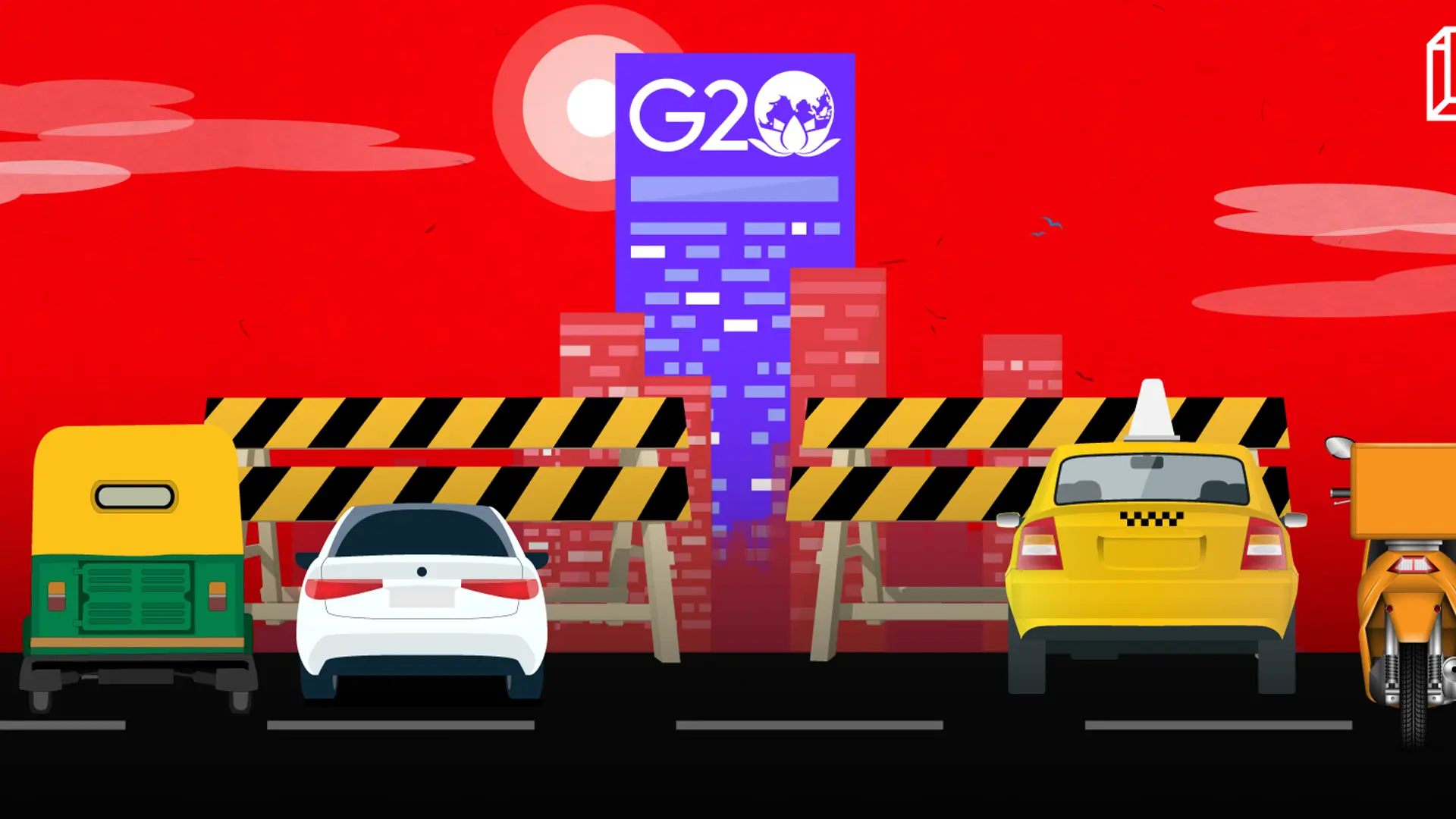Gig workers in Delhi worried about delivery ban, traffic restrictions
With Delhi becoming a fortress for the G20 summit, gig workers are worried about the online delivery ban, the lack of clarity about the security measures and the effect it will have on their personal budgets.
When global leaders from G20 nations meet in New Delhi this week to discuss issues that shape the world of the future, Guddu living in one of Delhi’s poorer tenements will be occupied with more immediate concerns.
A gig worker who relies on the income he generates every day, Guddu is worried about the government’s three-day ban on online deliveries in certain parts of the Capital during the G20 summit.
"Of course it is going to be a problem, our work will stop but rent won't stop,” he says, looking at the flyover near Vasant Kunj, which will be blocked for traffic as a security measure. “We'll have to feed ourselves too,” says Guddu, who delivers food for an online startup.
To ensure foolproof security for global leaders, the Delhi Traffic Police has restricted the entry of commercial vehicles and all categories of goods vehicles into the city from 9 p.m. on September 7 to 11.59 p.m. on September 10. Taxi cabs, too, will not be allowed to enter New Delhi from 5 a.m. on September 9 to 11.59 p.m. on September 10, unless they are ferrying residents and tourists with valid hotel bookings within the district.
However, vehicles carrying essential commodities, including milk, vegetables, fruits, and medical supplies, will be allowed into the restricted locations.
These restrictions are expected to severely limit gig workers engaged in offering last-mile deliveries and other services as well as those working with mobility aggregator platforms, such as , and .
While only certain parts of the Capital are closed to online deliveries, gig workers are worried that increased security even in areas they are allowed to operate in will make life hell over the next three days.
Many gig workers that YourStory spoke to are unsure of how to deal with the situation. Do they temporarily shift to other areas that are foreign territory to them, or do they hope that they can tackle the financial crunch by tapping into their friends and family network? One thing’s for sure though—work from home is not an option.

“Some of them (the other gig workers) even pay rent every day, I hope their landlords are kind,” continues Guddu, who is in his mid-40s.
Another gig worker Gaurav, 32, is unsure about the restrictions and is waiting for clearer instructions from his employers. He says if he is not allowed to work, his financial obligations—including a Rs 3,000 EMI— will make it impossible for him to pay his rent next month.
Challenges on ground
Delivery agents, cab drivers, and other gig workers expect the next three days to be challenging in terms of deliveries and fulfilling orders.
Aijaz, a driver with cab aggregator Uber, typically earns Rs 900 to Rs 1,200 a day, working for 12 hours. But with restrictions on movement between Delhi and Gurugram, he is not sure if he will get enough rides.
“Only people travelling to the airport and railway stations and government vehicles with special permission will be allowed to cross the state borders,” he says.
However, he says the local Uber office has informed the drivers that there are no restrictions for the three days. “I have no clarity.”
Uber did not respond to queries sent by YourStory.
A few others like Niranjan plan to move to a different zone in the National Capital Region. But even there, earnings may be scarce due to many others with a similar plan.

Incentives, but for whom?
Although some online delivery apps and mobility platforms have announced incentives for those willing to work during the G20 summit in an attempt to maintain a skeletal staff, gig workers say the benefits may not be worth the trouble.
Food and grocery delivery startup , for instance, has announced incentives for those willing to work during the three days between September 8 and September 10, though it did not specify the details.
YourStory had sent out queries to Swiggy on the incentive structure. While the company did not comment specifically on the same, it said, “We want to ensure there is minimum impact on the earnings of our delivery partners and have shifted them to take on deliveries in the non-restricted zones.”
According to several delivery personnel who work with Swiggy, servicing New Delhi, the additional incentive given last month, for delivering 18 orders, was between Rs 300 and Rs 400. The incentive for September 8 has been revised to Rs 1,350 for delivering 28 orders, compared with Rs 1,375 for 30 orders as of September 6.
As per the new incentive structure, the rider cannot refuse or cancel more than one order. The delivery personnel will also be required to complete at least one peak slot between 12 p.m. and 4 p.m. or 7 p.m. and 12.30 a.m. and one off-peak slot.
“To complete one order, I have to drive an average of 5 km,” says Monojit, a Swiggy delivery agent.
For him to benefit from the new incentive structure, he would have to drive at least 100 kilometres. This is not worth the risk of being pulled up by law enforcement agencies, he says.
A spokesperson for Rapido, an on-demand bike-taxi aggregator, says the startup plans to announce higher incentives with lower ride targets to compensate its drivers for their loss in earnings, resulting from a decline in demand.
Spike in food and grocery orders expected
Meanwhile, online platforms engaged in food and grocery delivery anticipate increased demand from those working from home.
“With most people working remotely and movement restrictions in place, we anticipate a significant surge in demand—a 30-40% rise in New Delhi and over 10% in other NCR cities compared to normal days,” says a spokesperson for quick delivery platform .
To address this surge, Zepto says it has significantly increased inventory in New Delhi and other NCR cities and secured necessary approvals from the authorities for delivery of daily essentials like dairy and vegetables.
It has also blocked the restricted routes in its navigation systems and relocated some of its riders from high-impact zones to other stores.
These measures will ensure continuity, rider safety, and seamless delivery, says Zepto.
“Additionally, control towers have been set up to support riders with on-ground concerns, if any,” says the spokesperson.
Food delivery company Zomato says its service will be operational in all areas of Gurugram, Noida, Faridabad, Ghaziabad, as well as Delhi, except for “a small part” of the NDMC area where the G20 summit is being hosted.
Delayed ecommerce delivery
Apart from affecting on-demand delivery and services, the restrictions may also impact scheduled ecommerce deliveries fulfilled by last-mile delivery partners.
Hence, logistics companies have had to revise their service level agreement with online marketplaces, direct-to-consumer brands, and sellers.
“We have proactively informed our merchant partners about the delay in same-day deliveries and express deliveries that they may experience. Additionally, these restrictions will inevitably affect the dispatch of orders from dark stores and mini-warehouses in and around New Delhi,” said Atul Mehta, COO of logistics aggregation platform .
For ecommerce platforms such as , and , a delivery delay of nearly three days is anticipated in the New Delhi District, says a spokesperson for logistics company .
The three ecommerce marketplaces did not respond to queries from YourStory.
“The orders for the restricted areas will be aggregated and distributed via the nearest centres so that the turnaround times can be expedited immediately after restrictions are lifted,” says Vishwachetan Nadamani, COO of Ecom Express.
Given the challenges they could face in the next three days, it isn’t surprising that some of the gig workers YourStory spoke to plan to take time off to relax or catch up on pending errands.
“I will clean my room, watch TV, eat and sleep,” says Parvez, a delivery executive for a food tech platform. “The other option is to load vegetables on a rented electric bike and sell them around nearby villages where there is going to be less security.”
Edited by Swetha Kannan




